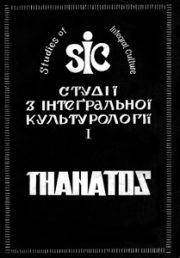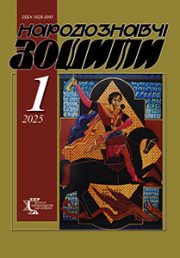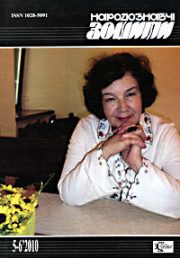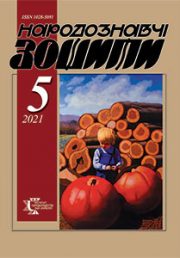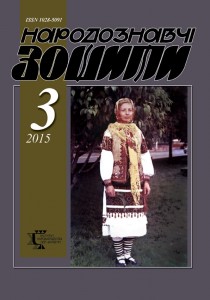
Sokil Vasyl. Anniversary sketches about folklorists. P. 523
It is mentioned about outstanding Ukrainian folklorists by whose inspired work were achieved significant results in the area of national science.Valentyna Borisenko is known not only as Ukrainian ethnologist, but also as folklorist, engaged in ritual poetry. Her records and researches have made a significant contribution to the study of the Holodomor subjects. Tatiana Ruda — a scholar dealing with Slavic interests of Ivan Franko, Maksym Rylskyi and many other scientists. It actualized Ukrainian folklore contacts with Serbs, Bulgarians and Russians. The scientific field of Lesia Mushketyk is connected with Slavic and Hungarian researches. Another direction of her studies deals with the study of anthropomorphism in Carpathian folk tales from the perspective of narrative traditions of Ukrainians and Hungarians. Different appeared to be interests of Mykola Dmytrenko: Ukrainian folklore history, theory and methodology of folklore, studies about dumas, researching of well-known personalities, promotion of Ukrainian literature.
Keywords: folklore, anniversary, folklore history, theory of folklore, methodology, Slavic studies, Bulgarian studies, Hungarian researches.
read »
Sokil Vasyl, Brynyak Oksana and others. Materials to ukrainian folkloristic encyclopedia. Issue 2. P. 530
The proposed collection articles to encyclopedia is a continuation of the materials published in «Narodoznavchi Zoshyty» («Ethnology Copybooks») (2014. — № 3. — P. 582—611) entitled «The beginning of Ukrainian folkloristic encyclopedia». There are involved new titles including personalities, published editions that deepen information about Ukrainian folklorists and various sources of oral poethics. For the first time there are presented folklore characters made up by folk tradition.
Keywords: Folkloristic encyclopedia, folklorists, folkloristic editions, folklore characters.
read »
Sokil Ganna. Scientific contacts of Ukrainian folklorists on the edge of the XIX and XX centuries. P. 580
Close cooperation of Ukrainian folklorists in the Shevchenko scientific society caused a positive impact on the development of science. In addition to personal relations, scientific relations were conducted among various institutions, societies. The important role played common ethnology expeditions and projects. Scientific researches, folklore materials, reviews — all was published in Ukrainian. The Shevchenko scientific society accumulated cultural and scientific identity of the nation, restored the best traditions of the past and laid foundation for the future.
Keywords: co-work, folklore studies, Ukrainian science, folklore collections, researches, publication of Shevchenko scientific society.
read »
Sokil Vasyl. The Okhrymovyches and the Rewakowyches (family relationships — scientific researches — national positions). P. 592
The article shows in the light of two families — the Okhrymovyches and the Rewakowyches — the relationships, scientific researches and national positions of great priests’ dynasties. Some of them were clergymen (Y. Okhrymovych, B. Okhrymovych, R. Okhrymovych, I. Revakovych, M. Revakovych), famous lawyers (T. Revakovych, Volodymyr Okhrymovych, L. Okhrymovych), journalists, teachers (O. Zaliznyak-Okhrymovych), doctors and leaders of UPA (S. Okhrymovych, Vasyl Okhrymovych, T. Okhrymovych etc.) or nationally conscious Ukrainians who had a reputation among their contemporaries. Because of their beliefs, many of them died. Each of these names took a high rank in the history of Ukraine.
Keywords: family of priests, church history, lawyer, doctor, folklorist, folk songs.
read »
Koval Halyna. Repeats in folklore texts: poetics of identity. P. 607
The article deals with repetition as a stylistic means in the system of calendar-ritual poetry. It is emphasized on the artistic function that forms image, causes some sensation in the recipient. Material presented on the phonetic, lexical and compositional levels. It is found the basic sense of repetitions, which is hidden in the identity of sounds, words and ideas. Revealed significant level of folklore text that enhances the emotional tone of the one.
Keywords: poetics of identity, alliteration, assonance, anaphora, epiphora, epanadyplozys, tautology.
read »
Chikalo Oksana. Functionality as a basic genre forming factor of ukrainian songs-chronicles. P. 616
This article deals with review of songs-chronicles’ functional system as a basic factor in shaping the poetics of the genre. There is emphasized on the informative, aesthetic and communicative aspects that determine the specificity in reproduction of reality, its artistic interpretation and ensure existence of songs-chronicles in live folk-song tradition.
Keywords: songs-chronicles, functions, reproduction of reality.
read »
Kozlovskyi Vitalii. Poetry of tragic in ukrainian ballads. P. 623
There is analyzed the poetic and aesthetic principles in forming of folk ballad tragic categories. The author has determined poetic tropes by which folk tradition achieves the appropriate aesthetic effect (metamorphosis, parallelism, comparison, epithet). There is researched the role of composition, motives and image system in depiction of the tragic conflict.
Keywords: ballad, poetic, tragic conflict.
read »
Bryniak Oksana. On the botanic symbolism of Ukrainians’ christening poetry. P. 632
In the paper have been analyzed botanic symbols in the structure of christening songs. Their genesis and semantics have been studied out. Conclusions as for functional destination of floral symbolism in the context of genre specificity have been exposed. Fundamental concepts of Ukrainian christening poetry, which are symbolized by botanic images, have been presented.
Keywords: christening song, symbol, image, botanic.
read »
Kovalchuk Olha. Kolomyika in genre system of Ukrainians’ and other lavonic neighbouring peoples’ folklore. P. 639
The article deals with the genre specificity of kolomyikas compared to other blocks of Ukrainian oral literature. There are outlined the history of the study, nominative variety of the genre, nature and functionality of it, geographical variation, thematic range, time and space, artistic and stylistic devices of kolomyikas.
Keywords: kolomyika, classification, functionality, artistic and stylistic devices.
read »
Kachmar Mariia. Ukrainian etiological legends: genesis, structure, semantics. P. 647
In the article the plots and motives of Ukrainian etiological legends about ethnoses (Jews, Gypsies, Poles, Russians, Belarusians) are analyzed. Attention is paid to the transformation in folk writings of Ukrainian ethnic stereotypes, including the mythological ideas about strangers and historical realities of coexistence of peoples.
Keywords: etiological legend, ethnic stereotypes, mythological ideas, ethnocentrism, motive.
read »
Demedyuk Maryna. The ethno-cultural specifics of animal images in ukrainian folk tales. P. 655
The article deals with ethno-cultural specifics of animal images in Ukrainian folk tale. It is researched that productive in folk tales about animals are not only the representatives of local fauna, but also exotic mammals. It is proved that national specifics is traced both at the level of household items and through the change of behavior reasons of animal images.
Keywords: folktales, animal image, wonderful helper, ethno-cultural specificity.
read »
Sokil-Klepar Natalia. Agricultural lexics as a component of carpathian microtoponyms. P. 660
This article describes a fragment of the cultural lexicon that motivates microtoponyms of Ukrainian Carpathians. The theme is about such economic activity as agriculture. Dominating turned out to be the names associated with burning and cutting down the forests. The significant place occupy microareas for grasslands, growing vegetables and grazing.
Keywords: microtoponym, cultural vocabulary, motivation, method of creation, economic activity.
read »
Sokil Vasyl. Correspondence between Alexander Konyskii and tyt Revakovych. P. 668
There is represented mailing of O. Konyskii and T. Revakovych — two prominent figures of Ukraine. A. Konyskii was one of the founders of the Shevchenko Scientific Society in Lviv actively involved in its support. His patriotic point of view and literary work influenced the formation of his position in public works as well as scientific interests of Galician progressive people. The views of his older colleague shared T. Revakovych, often met him, informed about the social, political, historical and cultural issues. Some correspondence depictures private lives of these outstanding personalities.
Keywords: correspondence, magazines, radicals, Moscow-followers, Notes of Shevchenko Scientific Society, literary language, biography of Shevchenko.
read »
Olha Kharchyshyn. Folkloristic research in folk art and ethnography magazine (until 1991). P. 713
The article traces methodological principles, main areas, themes, content and stylistic accents of folkloristic research in the journal Folk Art and Ethnography in time of its complicated development and gaining the Ukrainian independence.
Keywords: Folk Art and Ethnography, folklore, folklore studies, research, article, review, evaluation.
read »
Halyna Kravtsova. Folk song recorder by anna bilynska: genres, poetics. P. 725
In the article considerated Ukrainian folk songs recorder by Anna Bilynska — rural gifted singer from Hodovych. Classification of works by genre investigated their poetic component, traced the relationship recorded material with an array of folk from other areas.
Keywords: folk songs, genre, motif image.
read »
Viktoriia Mykhashchuk. The geography of folklore-collecting worksof Bogdan Zaklynskii. P. 733
The article on the basis of archival and printed sources presents the geography of folklore-collecting activity of Bogdan Zaklynskii, an active figure of the first half of the twentieth century. You will find biographical sketches, the influence of Lviv Shevchenko scientific society on folkloristic views of the researcher, get acquainted with ethnographical regions and names of sights, where collector was recording folklore material during his lifetime.
Keywords: Bogdan Zaklynskii, folklore activities, collecting activity, Stanislav.
read »
Lilia Snigyriova. Philosophical category of life and death in Ukrainian historical songs. P. 740
The article explores the philosophical concepts of life and death in the Ukrainian historical songs. Attention to the sacred phenomena of consciousness, which play an essential role in the formation of Ukrainian people, is concentrated. The images of courageous noble heroes with strong spirit, which went to death for the freedom and independence of fatherland, are depicted.
Keywords: historical song, life, death, character.
read »
Sokil Hanna. A new research on duma-studying. P. 745
read »
